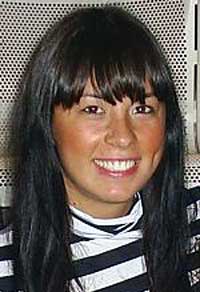 EPISODE ONE WAKE UP SLEEPY ZOMBIES EPISODE ONE WAKE UP SLEEPY ZOMBIES
Eek! For the first time in my life, in my 22nd year on the earth, I have one white hair on
my head! I of course, would not have realized this or felt upset if I had seen that one
white hair. But my friend saw that hair and told me and all I remember is that I screamed.
(If you have not found my column interesting up to now, you will today because I have
something of interest for almost everyone.)
This one white hair was (I plucked it from my head so it is no longer there) the result of
sleepless nights and hard days. I may be making a big deal but firsts are important and a
white hair for a 22-year-old girl is important too. No matter how much I try to be a
well-organized, well-prepared person and avoid being a "last minute person," I
can't help but become a sleepless zombie who walks to campus in anger with half closed
eyes. I wish a day had more than 24 hours. I wish my body and my brain would not need to
sleep.
But 24 hours is not enough. You should sleep. After little sleep my system gives me
signals. Coffee may not work after a while. Caffeine is not the jolt I needed to feel
alert. Nor do eating something or washing my face provide that jolt. You can't fight
sleeping forever. Show a white flag, hug your pillow, wrap up in a blanket, empty your
mind and close your eyes. Sleeping is so important that I am going to write about it for
the next two weeks. I did some research; I hope you find it interesting…
Stages of Sleeping
Sleeping occurs in stages. Our brain tells us how to sleep. There are five different
stages. In the first stage your brain gives signals to your muscles to relax, to your
heart to beat slower and your body temperature drops. In the second stage you are in light
sleep, which you may easily wake up from if you hear a noise and you may react to things
going around you. The third stage is referred to as slow-wave sleep. Your blood pressure
becomes lower, and then you may lose your senses and not feel the temperature around you.
It is hard to wake up in this stage of sleep. If you are a sleepwalker or sleep talker you
may become active in this stage. In the fourth stage of sleep it becomes very difficult to
wake up. If someone wakes you up, it will require a few minutes to connect to the world
and events around you. REM sleep is the fifth stage and stands for Rapid Eye Movement. In
this stage your muscles are totally relaxed. Your heart beats faster and you begin to
breathe regularly. You also begin to dream in REM sleep. During sleep you repeat these
stages every 90 minutes.
Talking about dreams is another story. Do not say that you don't dream. Everybody dreams,
but not everyone remembers his or her dreams. If someone wakes you up during the REM stage
you might remember everything about your dream. But if you wake up to an alarm, then it is
hard to remember the dream. However, objects may help you, if you saw a newspaper in your
dream, when you read the Bilkent News you might remember your dream. Some claim that
dreams are an opportunity for our brain to keep working. Others say that dreams help you
to sort the events of that day. And as for Freud, dreams are clues to what you pushed deep
inside your brain, such as what you worry or think about.
Following are some tips to help you fall asleep quickly. You may be very sleepy but
sleepiness is not enough to make you fall asleep. Once your daily routine has changed, it
becomes more difficult to fall asleep. Go to bed at the same time if possible (I know it
is hard for a student). Follow a bedtime routine, reading something; taking a warm bath or
counting the ships in your head like we did when we were children. Avoid things that
contain caffeine. Do not drink coffee up to four hours before you sleep. Do not exercise
before you go to bed, as it will give you energy; try to exercise earlier in the day. Use
your bed for sleeping not writing homework, or playing games. Teach your body to associate
sleeping with your bed. Also, before going to bed read your notes or study for exams so
your brain can restore the information when you sleep. This works for me.
It is not scientifically proven why we sleep. All that we know is that sleeping is a
building process for mind and body. Sleeping allows the body and brain to collect energy.
We spend all day thinking and creating, and that uses up our energy stores. In this
episode of my column I hope I reintroduced you to something that we have been used to from
the first day of our lives.
Gülay Acar (COMD/IV)
howtoreachgulay@yahoo.com
 |







